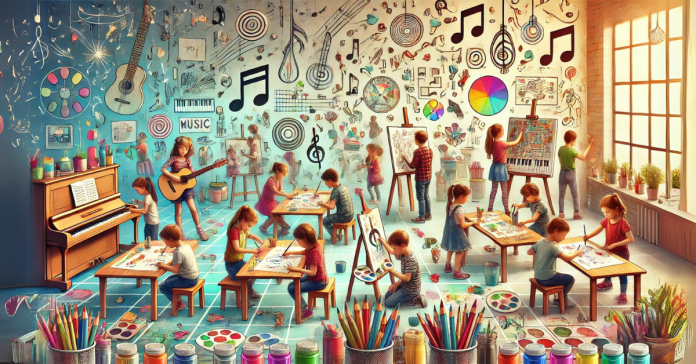Art plays a vital role in the development of children, offering benefits that go far beyond creating aesthetically pleasing works. From fostering creativity to developing critical skills, art education helps shape well-rounded individuals.
Here are the key reasons why learning art is important for kids:
1. Fosters Creativity
Art encourages children to think outside the box and express themselves in unique ways. Whether through drawing, painting, sculpting, or other mediums, art allows kids to experiment with ideas, explore their imagination, and solve problems creatively. These skills are essential not only in artistic fields but in virtually every aspect of life.
2. Enhances Fine Motor Skills
Art activities like coloring, cutting, and molding clay help improve fine motor skills by developing hand-eye coordination and precision. These physical skills are foundational for tasks such as writing, typing, and using tools.
3. Builds Confidence
Creating art provides a sense of accomplishment, boosting self-esteem. When kids complete an artwork, they feel proud of their effort and learn that perseverance leads to results. Art also allows for self-expression, helping children feel valued and understood.
4. Improves Communication Skill
Art offers kids a non-verbal way to express thoughts and emotions that they might not be able to articulate. This is especially important for children who struggle with verbal communication or are learning a new language. Art becomes a universal medium through which they can connect with others.
5. Encourages Problem-Solving and Critical Thinking
When creating art, kids make decisions about colors, shapes, and techniques, teaching them to analyze situations and think critically. This problem-solving process enhances their ability to approach challenges creatively and with an open mind.
6. Promotes Cultural Awareness and Empathy
Through art, children can learn about different cultures, traditions, and perspectives. This exposure helps them appreciate diversity and fosters empathy as they understand the world through the eyes of others.
7. Supports Emotional Well-Being
Art provides an outlet for kids to process their emotions and reduce stress. It can be therapeutic, offering a calming and enjoyable activity that helps them navigate complex feelings.
8. Boosts Academic Performance
Studies have shown that art education supports cognitive development, which can enhance performance in other subjects. Skills developed in art—such as observation, focus, and interpretation—are transferable to areas like science, math, and reading.
9. Prepares Kids for the Future
In a rapidly evolving world, creativity and adaptability are increasingly valued. Art nurtures these qualities, equipping kids with skills that are essential in both traditional and emerging career paths.
10. Encourages Collaboration and Social Skills
Group art projects teach kids how to work together, share resources, and appreciate the input of others. This fosters teamwork and helps them develop strong interpersonal skills.
Learning art is not just about creating beautiful works; it is a powerful tool for personal growth and development. By fostering creativity, improving cognitive and motor skills, and promoting emotional well-being, art education provides kids with a strong foundation for success in life. Encouraging children to explore and engage with art helps them become more confident, empathetic, and well-rounded individuals.

